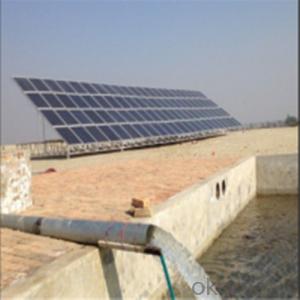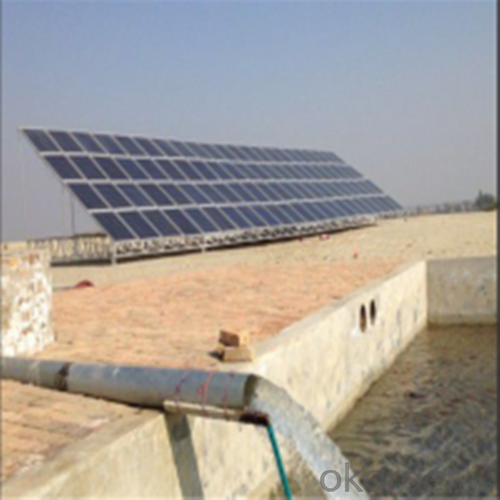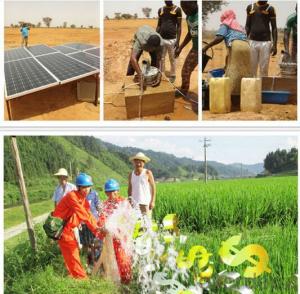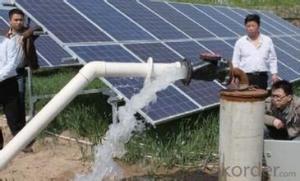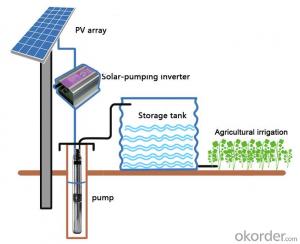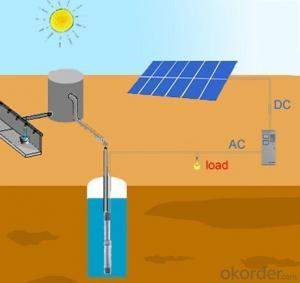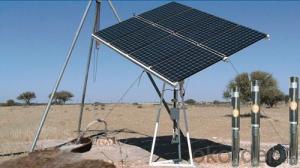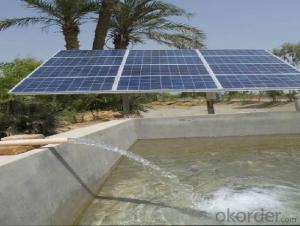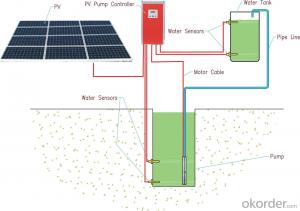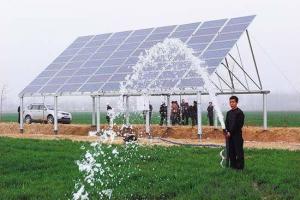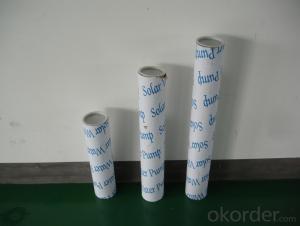Rain Barrel Solar Pump - Solar Powered Water Pump Solar Water Fountain
- Loading Port:
- Shanghai
- Payment Terms:
- TT OR LC
- Min Order Qty:
- 1 set
- Supply Capability:
- 1000 set/month
OKorder Service Pledge
OKorder Financial Service
You Might Also Like
solar water pump
DC solar water pumping system consists of the motor, pump, controller, solar array and some other accessories, such as water level sensor, float switch, etc. Considered that storing water is more efficient than storing electricity, the system is designed to directly drive the pump without battery which can reduce the construction and operating cost and routine maintenance effectively.The PV array consists of multiple solar panels connected in series/parallel, which can supply the whole system as power source by converting the absorbed solar radiation energy to the electrical energy. The pump driven by a brushless DC permanent magnet motor draws water from deep-well or river. The pumped water is then fed into reservoir or water tank, or connected to the irrigation system or fountain system directly.
Advanced Technology
Applications Innovation
The efficiency of DC brushless permanent magnet motor has been increased up to 25% in comparison with traditional asynchronous motor.
Technology Innovation
Stator and rotor are sealed by environment friendly casting resin.Motor insulation resistance can be hold higher than 300MΩfor more than 10 years, which consumedly increased the security and reliability of the submersible motor.
Structure Innovation
Casting resign technology processed stator and rotor as well as the water lubricated bearing make the submersible pump environment friendly.
Feature
High Efficiency & High Reliability
DC Brushless Permanent Magnet Motor
Minimum Maintenance, long Service Life
Environment Friendly Materials, Lubricated Without Oil
Application
Village or Family Water Supply
Animal Drinking Water & Livestock Watering
Garden/Courtyard Irrigation
Swimming Pool
Water Supply for Bivouac or Camping Car
Water Supply for Remote Area
Automatic Control
Operate Automatically, No Need Watching
Maximum Power Point Tracking (MPPT)
Dry-run Protection
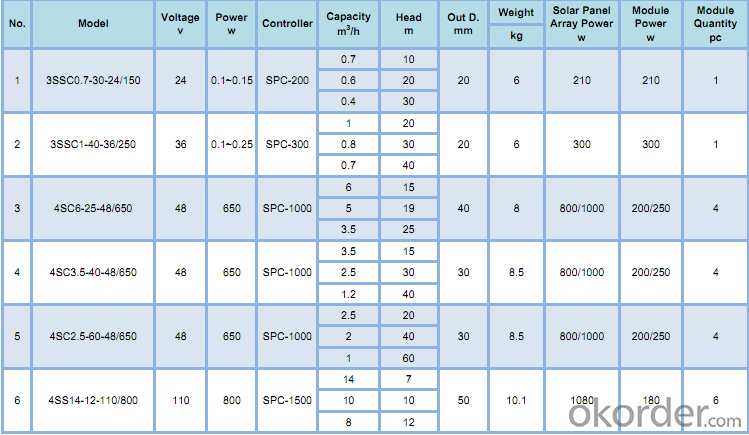
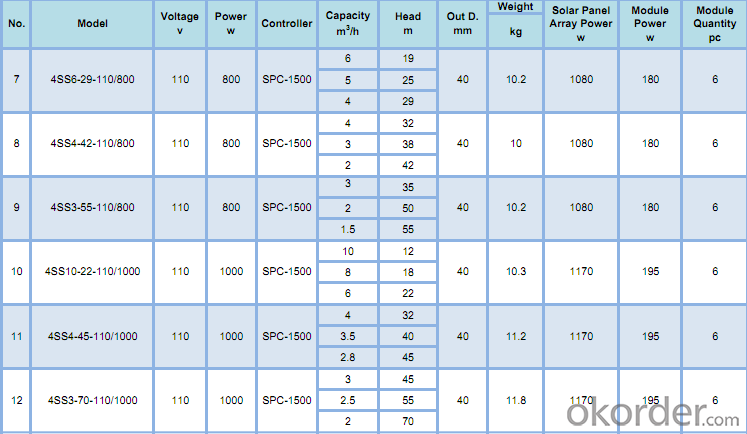
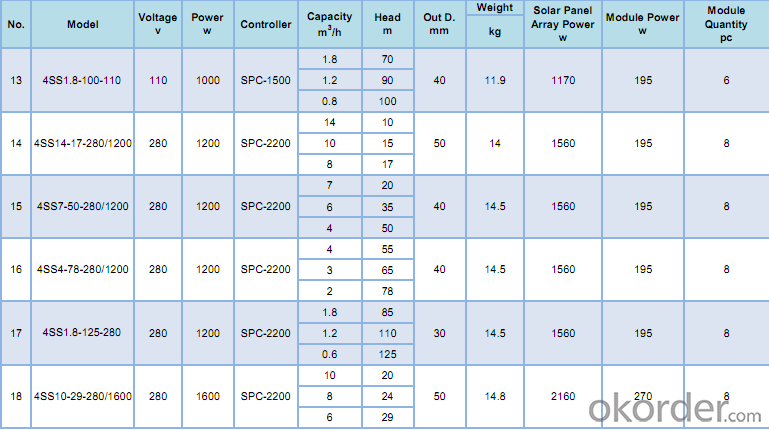
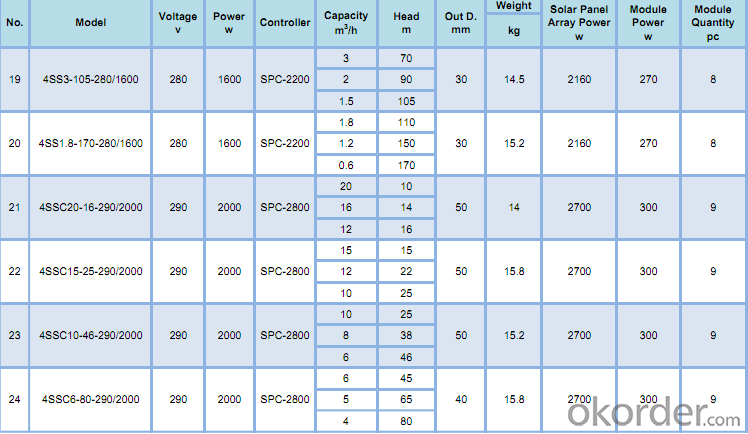
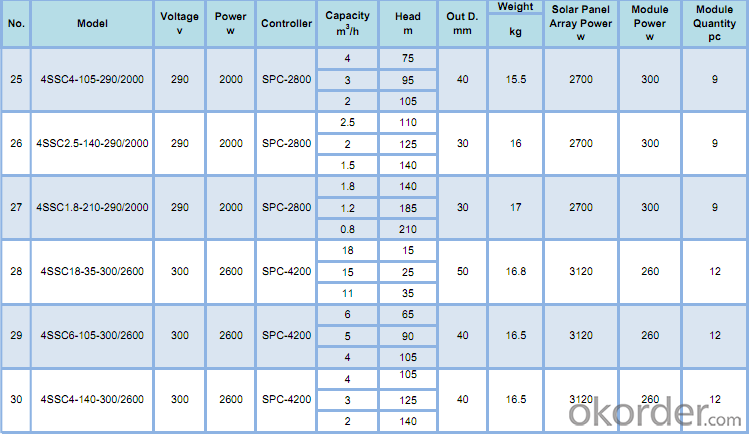
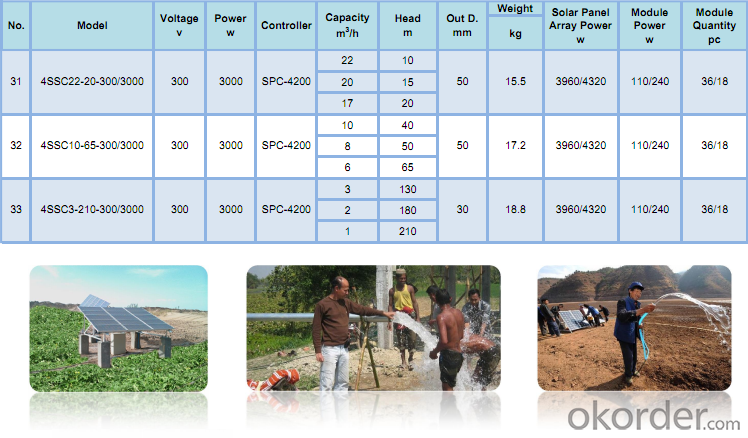
- Q: Can a solar pump be used in recreational water parks?
- Yes, a solar pump can be used in recreational water parks. Solar pumps are an environmentally friendly and cost-effective solution for water circulation and filtration in recreational water parks. They harness the power of the sun to operate, eliminating the need for electricity and reducing operational costs. Solar pumps can provide reliable and efficient water circulation, ensuring clean and safe water for visitors to enjoy in water parks.
- Q: What are the advantages of using a solar pump?
- There are several advantages of using a solar pump. Firstly, it is a cost-effective and environmentally-friendly option as it relies on solar energy, which is a renewable source of power. This helps to reduce electricity costs and dependence on non-renewable energy sources. Secondly, solar pumps are independent of the power grid, making them suitable for remote areas or places with unreliable electricity supply. Additionally, they require minimal maintenance and have a long lifespan, leading to reduced operating costs. Moreover, solar pumps can be easily installed and are highly versatile, capable of pumping water for various purposes such as irrigation, livestock watering, and household use. Overall, using a solar pump promotes sustainability, reduces expenses, and provides a reliable water pumping solution.
- Q: How does a solar pump handle water with high levels of ammonia or other pollutants?
- A solar pump is typically not designed to handle water with high levels of ammonia or other pollutants. These pumps are primarily used for clean water applications and may not be equipped with the necessary filtration or treatment systems to handle contaminated water effectively. In such cases, alternative water treatment solutions or pump systems specifically designed for polluted water would be more suitable.
- Q: Can a solar pump be used for water supply in remote research stations or observatories?
- Certainly, remote research stations or observatories can absolutely benefit from the use of a solar pump for water supply. These pumps are fueled by solar energy, meaning they don't rely on grid electricity or any sort of fuel for operation. As a result, they are an ideal option for locations that have limited or no access to electricity. Solar pumps are specifically designed to effectively extract water from wells, boreholes, or other water sources, and can serve various purposes such as drinking, irrigation, or supporting research-related activities. Moreover, solar pumps are not only easy to install and maintain but also boast significantly lower operating costs compared to traditional pumps powered by fuel. Given the ample sunlight typically available in most remote areas, a solar pump emerges as a sustainable and dependable solution for ensuring a consistent water supply in research stations or observatories.
- Q: How does a solar pump handle water source contamination from oil spills?
- A solar pump does not directly handle water source contamination from oil spills. However, it can be used as a tool to help mitigate the effects of the contamination. Solar pumps can be used to extract and pump clean water from unaffected sources to provide alternative water supplies in areas affected by oil spills. This can help minimize the reliance on contaminated water sources and reduce the risk of further contamination.
- Q: Can a solar pump be used in areas with limited access to water treatment?
- Yes, a solar pump can be used in areas with limited access to water treatment. Solar pumps are designed to extract water from various sources such as wells, rivers, and lakes. While they alone cannot treat water, they can efficiently pump water to a central treatment facility or directly to communities for treatment. This makes solar pumps a valuable solution for areas that lack access to traditional water treatment infrastructure.
- Q: Can multiple solar pumps be connected to create a larger water supply system?
- Yes, multiple solar pumps can be connected to create a larger water supply system. By connecting multiple pumps in parallel or in series, the combined pumping capacity can be increased, providing a larger volume of water and enabling the system to meet higher demand. Additionally, connecting multiple solar pumps allows for redundancy and improved system reliability, as if one pump fails, the others can continue to operate.
- Q: How does the performance of a solar pump vary with different solar panel efficiencies?
- The solar pump's performance can vary greatly depending on the efficiency of the solar panels used. Solar pumps rely on solar panels to convert sunlight into electrical energy, which is then used to power the pump. The efficiency of a solar panel refers to its ability to convert sunlight into usable electricity. When higher efficiency solar panels are used, they are able to convert more sunlight into electricity, resulting in increased power output. This means that a solar pump connected to highly efficient solar panels will have a higher energy output, leading to a higher flow rate and increased water pumping capacity. Conversely, solar panels with lower efficiencies are not as effective at converting sunlight into electricity. This leads to lower power output, which can negatively impact the performance of the solar pump. A pump connected to less efficient solar panels may have lower flow rates and reduced pumping capacity, especially during times when sunlight intensity is lower or daylight hours are shorter. In addition, the performance of a solar pump is influenced by other factors such as the pump's design, the type of motor it utilizes, and the overall system configuration. However, the efficiency of the solar panels remains a critical factor in determining the overall performance of the solar pump. Therefore, it is crucial to consider the efficiency of the solar panels when choosing a solar pump system. Higher efficiency solar panels generally result in better performance and more dependable water pumping capabilities, particularly in areas with limited sunlight resources.
- Q: What is the expected noise level generated by a solar pump system?
- Solar pump systems are known for their exceptionally low noise levels. Unlike traditional pump systems with motors or engines, solar pumps operate silently and produce minimal noise. The primary sources of noise in a solar pump system are the water flow and the movement of mechanical valves. However, these noises are usually inaudible or barely perceptible, especially when compared to conventional motor-powered pump systems. As a result, solar pump systems are highly recommended for noise-sensitive environments, such as residential areas or places where noise pollution must be kept to a minimum.
- Q: How do solar pumps handle water with high pesticide or herbicide content?
- Solar pumps do not have any specific mechanism to handle water with high pesticide or herbicide content. However, the use of solar pumps in such situations can help reduce the environmental impact of pumping contaminated water as they do not contribute to the pollution themselves. To ensure safe usage, it is recommended to implement proper filtration or treatment systems to remove or minimize the presence of pesticides or herbicides in the water before it is pumped.
Send your message to us
Rain Barrel Solar Pump - Solar Powered Water Pump Solar Water Fountain
- Loading Port:
- Shanghai
- Payment Terms:
- TT OR LC
- Min Order Qty:
- 1 set
- Supply Capability:
- 1000 set/month
OKorder Service Pledge
OKorder Financial Service
Similar products
Hot products
Hot Searches
Related keywords
